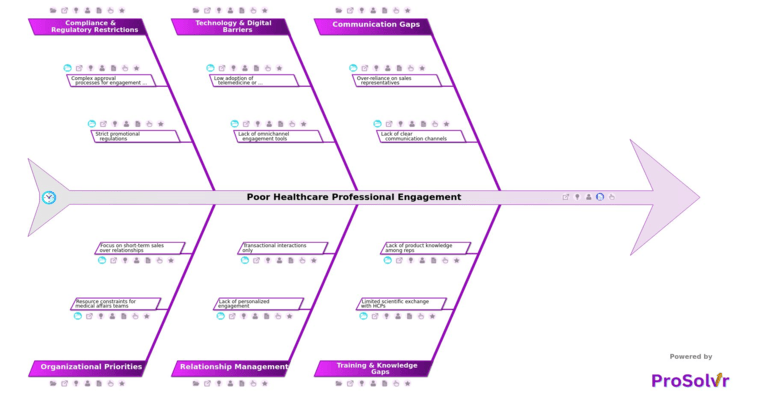RCA of Poor Healthcare Professional Engagement
Poor healthcare professional (HCP) engagement is one of the most pressing challenges in the pharmaceutical industry. Strong, trust-driven relationships with clinicians are essential for safe and effective use of therapies, yet many companies face persistent communication gaps, training and knowledge gaps, and digital barriers. Over-reliance on sales representatives, lack of clear communication channels, and limited digital engagement platforms often weaken connections with HCPs, reducing trust and compromising patient outcomes.
Inadequate training and scientific exchange make the problem worse. With few advisory boards or medical forums and insufficient medical training programs, many field representatives lack the depth of product knowledge required to provide meaningful support. Combined with transactional interactions that focus only on sales targets, and the absence of personalized engagement or segmentation of HCP needs, these gaps create a fragile foundation for long-term collaboration.
Technology and compliance add further obstacles. Low adoption of telemedicine, e-detailing, and omnichannel engagement tools, together with outdated CRM systems, limit digital transformation. Meanwhile, strict promotional regulations and complex approval processes delay engagement initiatives, making it harder for organizations to deliver timely, compliant, and impactful interactions with healthcare providers.
The solution lies in root cause analysis (RCA) powered by GenAI and Six Sigma frameworks. Applications like ProSolvr by SmartQED enhance RCA by combining AI-driven insights with fishbone diagrams and cause tree visualizations. ProSolvr enables pharmaceutical companies to identify systemic barriers, map interdependencies, and design corrective and preventive actions (CAPA) that move beyond short-term fixes. With ProSolvr, organizations can achieve sustainable, long-term HCP engagement, strengthen physician relationships, and improve patient outcomes.
Who can learn from the Poor Healthcare Professional Engagement template?
- Medical Affairs Teams: They can identify gaps in engagement strategies and design initiatives that foster stronger scientific exchange with healthcare professionals.
- Sales and Marketing Teams: They gain insights into why traditional engagement approaches may fail and how to align strategies with long-term relationship building.
- Regulatory and Compliance Officers: They can understand how engagement efforts are shaped by regulations and ensure CAPA plans remain compliant with industry standards.
- Training and Development Departments: They can use the findings to create tailored programs that strengthen product knowledge and communication skills among field representatives.
- Digital Transformation Teams: They learn how outdated systems or resistance to technology hinder engagement and can prioritize investments in modern digital tools.
- Executive Leadership: They can recognize the strategic importance of sustainable HCP engagement and allocate resources toward initiatives that improve trust and long-term collaboration.
Why use this template?
A GenAI-powered root cause analysis (RCA) transforms poor healthcare professional (HCP) engagement into a structured improvement opportunity. Instead of treating only surface-level symptoms, it reveals the real drivers behind communication gaps, training deficiencies, compliance restrictions, and weak relationship management. This enables pharmaceutical organizations to design corrective and preventive actions (CAPA) that resolve root issues, strengthen communication strategies, and build long-term trust with clinicians.
ProSolvr by smartQED enhances this process by combining GenAI intelligence with RCA tools such as fishbone diagrams and CAPA strategies. By making analysis systematic, collaborative, and transparent, ProSolvr helps teams uncover hidden barriers, improve engagement strategies, and create sustainable partnerships with HCPs that ultimately lead to better patient outcomes.








